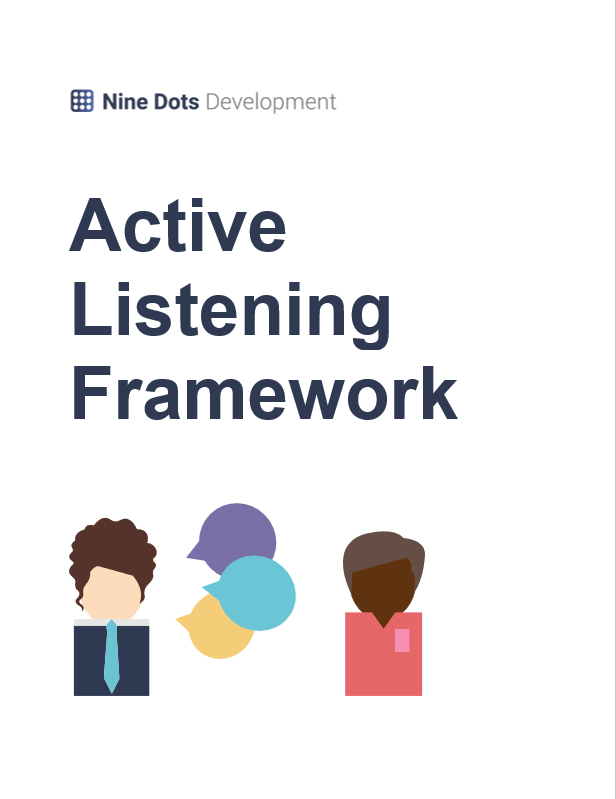Friday 06 Aug 2021 Article
The TakeawayHow to Avoid the #1 Annoyance at Work
Considerations for an Improved Workplace Culture
Part 2 of 2
#BetterWorkplace #ActiveListening #Framework
The perfectly matched resource for this article...
Download Active Listening Do's and Don't Framework!
Please click the button to download our 'Active Listening Framework' which gives you the do's and don'ts of active listening.
Download framework!Playing catchup?
How to Avoid the #1 Annoyance at Work
For many employees, the single biggest annoyance at work is feeling like they aren’t truly valued and listened to by their colleagues and managers.
People are typically extremely good at noticing when the person/people they are speaking to aren’t actually listening. Far too often, people simply wait until it’s their turn to speak instead of truly paying attention to and trying to understand what the other person is saying.
The most impactful way you can improve your listening skills is by practicing active listening.
What is Active Listening?
Active listening is about making a conscious effort to really hear not only the actual words being said, but the overall message that is being communicated; it is one of the most valuable skills you can possess.
Concerningly, research shows that we only actually pay attention to and remember 25-50% of what we hear; this means that at least half of the time, we aren’t actively listening.
Passive listening (the opposite of active listening) can not only lead to misunderstandings, it can also make the person speaking feel extremely unmotivated and offended as, by not actively listening, you are suggesting that you don’t value what the other person is telling you.
{{ADVERT}}
How Active Listening Benefits YOU
Establishing the habit of active listening is the foundation for any successful conversation and it brings many benefits, including:
- Improved job performance
Being able to really understand what you are being asked to do means that you can deliver higher-quality work. - Higher quality of relationships
Making others feel valued by showing that you are listening to them helps strengthen working relationships and improve team morale - Elicit a more positive response
It’s impossible for us to agree with others 100% of the time; sometimes, we do need to counter their point or offer constructive criticism. However, if you first show care and understanding by really listening to the other person, you are much more likely to elicit a positive response when you communicate your disagreement. - Increased productivity
Active listening not only helps you understand messages better, it also helps you understand them quicker as the person speaking is much less likely to have to repeat what they have just said. Understanding messages quicker enables you to start working on tasks soonber, ultimately making you more productive. - Better influential ability
Another undeniable benefit of active listening is being able to gain more trust from your teams and colleagues, improving your persuasive ability and making it much easier to gain buy-in. - More decision-making power
By showing that you do listen and take into consideration others’ ideas and emotions, you are much less likely to be faced with counter arguments like “But you don’t see this from my perspective” when trying to make decisions or enforce changes. - Avoid conflict
As we briefly mentioned above, active listening can help you avoid conflict as it prevents the speaker from feeling that their voice isn’t heard. - Solve problems more efficiently
By gaining a better understanding of what is being communicated through active listening, you get a clearer picture of situations and can therefore solve problems much more efficiently. - See things from others’ perspectives
Not only does seeing things from others’ perspectives make them feel valued, it can also give you new ideas and insights that you may not have otherwise had. - Less time wasted
By ensuring that you understood the message correctly (a key part of active listening), you will likely make fewer errors, meaning less re-work and ultimately less wasted time.
Avoid Expert Error with This Active Listening Framework
When trying to learn any new skill, it’s important to use a framework to avoid expert error. Expert error is where we perceive ourselves as ‘experts’ and therefore fall into the trap of thinking we don’t need a structured way of doing things, often leading to crucial steps being missed.
To help you get started with practising active listening, we have created a fantastic framework that details things you should do when listening and things you shouldn’t do. You can download this framework by clicking here or clicking the button at the bottom of this article.
---
Next time on The Daily Dot, we will be looking at National Apprenticeship Week, and how apprenticeships can help you develop your workforce into skilled, confident, competent professionals.
Until next time...
Download Active Listening Do's and Don't Framework!
Please click the button to download our 'Active Listening Framework' which gives you the do's and don'ts of active listening.
Download framework!Missed an article?
More from Considerations for an Improved Workplace Culture
